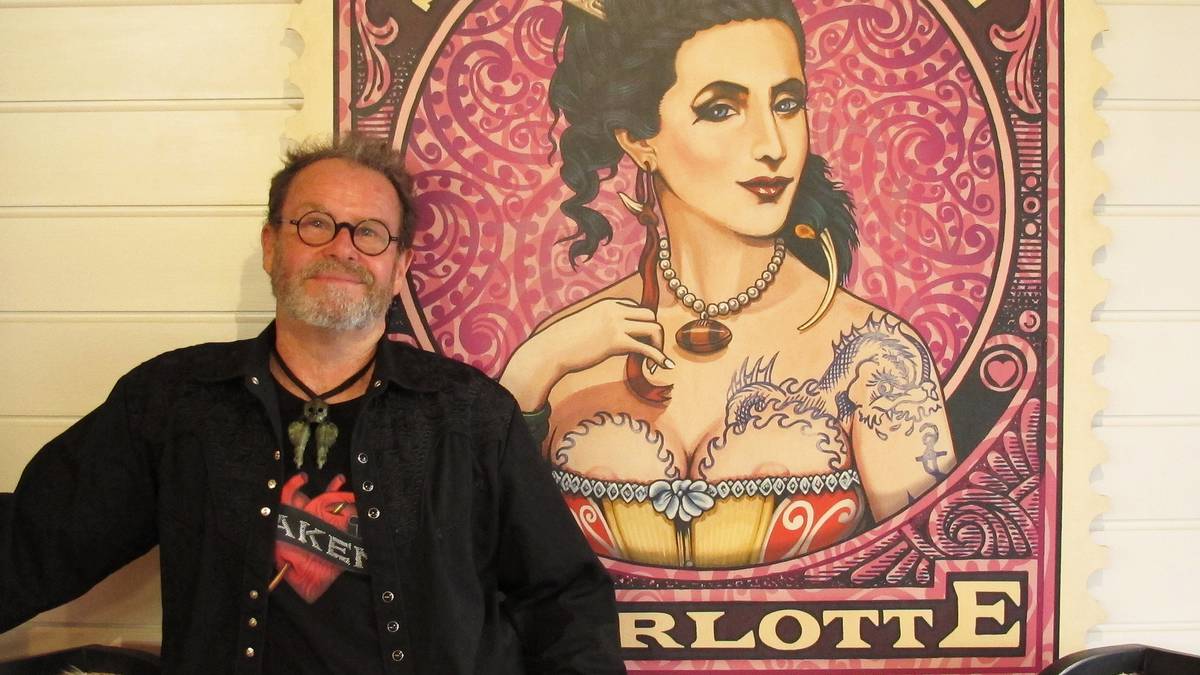Northland artist Lester Hall is closing his Kerikeri art studio and removing Māori influences from his controversial artworks. Photo / Peter de Graaf
Northland artist Lester Hall is calling it quits, saying he has been cancelled by people who say that as a Pākehā artist he shouldn’t use Māori symbolism in his work.
Hall said he is closing
his Kerikeri art studio and removing Māori influences from his controversial artworks after “sustained and nasty attacks” on him and an Auckland gallery that represents him.
Hall said he is “not bitter and resentful” about the gallery’s decision, and that it was the “right moment to hand the conversation to Māori”. Hall claims the abuse has prompted The Poi Room gallery to stop selling his work which merges Māori symbols with Kiwiana imagery.
“Three years ago a group of people with a specific drive to get Pākehā artists out of that space, where they might try to be inclusive, these people have been attacking us online.
“I’m really sad about it.
“I’m sad I’m not working with 20 Māori and Pākehā artists testing each other’s ideas and creative questions. Art is a question, it’s not the answer.
“They [The Poi Room] rang…and said it’s all gotten too nasty and we’re removing your work.”
/cloudfront-ap-southeast-2.images.arcpublishing.com/nzme/6ZZYKBQCSTGO7HZOX7MGWJZBAY.jpg)
The Poi Room has been contacted several times for comment but has repeatedly declined.
Hall is known for his controversial paintings, such as a topless Māori woman shot with arrows and holding a pounamu mere entitled Remember Them, along with images of All Black Sid Going passing a severed Māori head, and James Cook with a moko and a print with the title Cheeky Little Darkie.
Hall said he has “enjoyed an extraordinary relationship” with The Poi Room, which has galleries in Newmarket and Ponsonby, for 15 years.
The attacks had been going on for some years but “really ramped up since Covid and lockdown”, he said.
Hall wasn’t sure if it was directed at any particular artwork but said their problem could be his use of “kowhaiwhai”, Māori motifs traditionally painted in whare tipuna (meeting houses), pataka (storehouses), and on the prow of waka.
Dr Karaitiana Taiuru, a tikanga Māori expert and advocate for digital Māori rights, cultural appropriation, Māori representation and intellectual property rights, said Māori elements could be used by non-Māori “if there is knowledge of what the element is and of appropriate cultural practices”.
/cloudfront-ap-southeast-2.images.arcpublishing.com/nzme/LCKNO5Q5QUKLJZCKB227C3HM6E.jpg)
Taiuru considered Hall’s artwork as “blatant cultural appropriation”.
Captain Cook, Sir Edmund Hillary, and the late Queen having Māori elements added to them “reflects an artist who thinks his own culture is superior to Māori”, he believed.
“The overall impression I have of this art is that it is saturated in hints of colonial superiority over Māori. Art should not be vulgar and offensive to a minority and any shop that sells and promotes such art is just as bad as the artist.”
Far North multimedia artist Paitangi Ostick, of Ngāti Wai, Ngāti Hine and Ngāpuhi descent, said Hall’s decision was “a sad outcome”.
“I love Lester’s work. I understand it completely.
“The problem is people don’t ask the question of how he got to that point of what he’s produced.
“Art should create conversation. It shouldn’t create bullying and that’s what’s happened to him.
“I feel that he’s being targeted for the wrong reasons.
“If those people sat down with him and had a conversation about how he got to the finished artwork, it’d blow them away, and they’d get it.”
/cloudfront-ap-southeast-2.images.arcpublishing.com/nzme/K7PTIPR2ZL5RCTPZ2MUXXZAFGM.jpg)
Ostick said she and Hall had many “big conversations about me being Māori and him being Pakeha”.
“It’s a bridge for me, a meeting point from Māori to Pākehā, that’s what his art represents to me.
“I don’t know how many artists use exactly the same kowhaiwhai pattern.
“Those people whoever they are, I can guarantee if they look at their own whakapapa they’ve got a bit of Portuguese or something […] because we all have.”
Hall said he was “closing Ngāti Pākehā” and planned to change or remove a number of artworks, including removing the “Schoon kowhaiwhai out of my present catalogue”.
He would also change the Queen Of The Fern II, one of his most popular artworks, which would be replaced with a kowhaiwhai-free version.
/cloudfront-ap-southeast-2.images.arcpublishing.com/nzme/KXMRZUUFC2LH6HRTC4TFYNRC6I.jpg)
“I’m doing this with aroha, not resentment,” he said.
“Within my art, I wanted to address a coming together, a conversation. That’s what I’ve been attempting to do.
“All my artwork […] had a kaupapa. I gave it a go, I turned up and did my haka, now what I want to project is a process of leaving the space, so people can understand it.”
Hall’s work is sold at a number of Northland galleries including the Helena Bay Gallery. They also feature heavily at the iconic Duke of Marlborough Hotel in Russell and Charlotte’s Kitchen in Paihia.
Duke of Marlborough co-owner Anton Haagh said he was “saddened” to hear of his friend’s decision.
“It’s sad to see someone having to be that concerned for their own safety whether it’s online or not, it’s had a real effect.
“Everyone’s entitled to their opinion. Many people both Māori and Pākehā love his art. They know the man.
“The art is trying to ask questions not make statements – and the questions are interesting.”
Hall said he was recently diagnosed as neurodiverse and “a bit on the spectrum”.
The discovery “has been incredible but challenging, and I have to understand I view the world differently to most”, he said.
Hall said he had “no idea” what is next.
“It’s 20 years of my life.
“I have to resettle my life … in losing this I know I’m going to feel without an anchor. “




